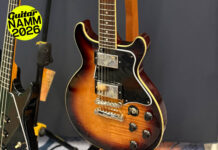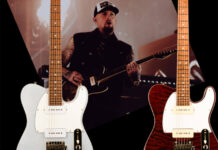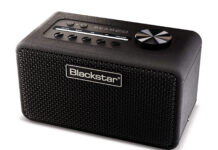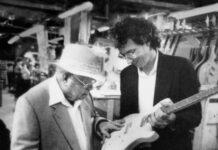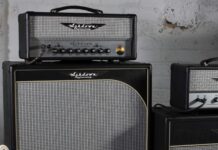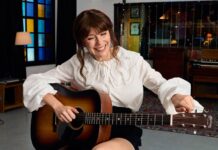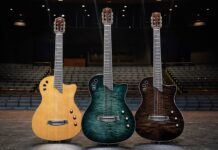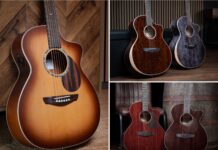
Meet Orla Gartland, the independent singer-songwriter embracing her instincts
Orla Gartland’s debut album, 2021’s Woman on the Internet, cemented her style of introspective songwriting and her pared-back alt-pop sound. But last year, Gartland, along with her friends and fellow solo artists Dodie, Greta Isaac and Martin Luke Brown formed the supergroup FIZZ.
READ MORE: Scratches, stickers and actual bloodstains: meet James Bay’s battleworn guitars
Bold, eclectic and whimsical, it was a change of pace from Gartland’s solo work, both in the process and the product. “The FIZZ album was made very quickly and instinctively, and Woman on the Internet was made quite carefully and slowly,” Gartland tells Guitar.com from her studio, where FIZZ’s album The Secret to Life, released last year, sits on the wall behind her.
While promoting The Secret to Life, Gartland was working on her second solo album, Everybody Needs a Hero, out on October 4. “With Everybody Needs a Hero, I tried to capture a bit more of that FIZZ spirit of not overthinking it,” she explains. “Trying to get myself to the finish line quickly, be more up for using demo vocals and committing quite quickly, and realizing that a lot of the joy in the recording gets lost when you overcook it or sing it too many times.” She credits Peter Miles, who served as producer on The Secret to Life and co-producer on Everybody Needs a Hero, for encouraging her to embrace that mindset.
Orla Gartland. Image: Nicole Ngai
“The FIZZ album is so theatrical and camp and so indulgent and all the key changes and everything… I felt like I was a bit more up for that, or my own version of that,” Gartland, who co-produced her own album, says. She points to the deceptively fun Late to the Party as an example. “[It] goes a lot of different places, and changes tempo, and it’s just indulgent,” she adds. “And I think I was more up for being indulgent post-FIZZ.”
She collaborated on the track with Declan McKenna, who was Gartland’s “first choice” for a feature on the album. “I just think about him being so timeless,” Gartland says. “I could imagine him being big in the 60s or the 80s… He’s a legacy artist to me already, even though he’s quite young.”
Do you remember what your first guitar was?
“I had a Yamaha acoustic, which actually sounded so good…. But I do remember playing it a few years ago, because I still have it in my house… and being like, this is good. For a hundred-euro guitar, this is not bad. I’ve definitely played worse guitars that cost a lot more… I covered it in stickers. It was classic teenage shit. [Laughs]”
Orla Gartland. Image: Nicole Ngai
Were there any specific pieces of gear, guitars, pedals or amps that played a big role in the recording process for Everybody Needs a Hero?
“Down in Middle Farm, which is the studio where we did both the FIZZ album… and my album, Pete [Miles] has this set of guitars that are quite old and bashed… He’s got a [Telecaster] that sounds so Tele-ish and it’s perfect, and it’s white, and all the paint is bashed off it, but it sounds extra Tele twang-y, and so that is all over the whole thing. Tom [Stafford, co-producer] has a left-handed custom Fender [Stratocaster]… And he played that on a lot of the songs, like, Three Words Away, and again, those ones with very angular riffs – that’s usually Tom’s lefty Strat.
“This [rubber bridge] is definitely all over Mine and Simple and a few others. And I really, really like it…. I do get the rubber bridge hype.”
What do you like about the rubber bridge?
“The whole thing is that it has no sustain. It’s very short and sharp and plucky. And I really love that about it.I do think that the kind of music that it’s known for is the Phoebe Bridgers stuff, [which] is obviously amazing, but the way that Phoebe uses it, and even Dodie uses it, is very tiny and finger-pick-y.
Orla Gartland. Image: Nicole Ngai
I really enjoy playing it when it’s driven quite hard and played like an electric because it sounds really good… It sounds… quite bitey and ugly… I quite like the novelty of playing a guitar that looks that cute… I enjoy the jarring disconnect, visually and sonically that you can get from it.”
You also worked with Lauren Aquilina, who’s your friend, but has also become a prominent songwriter.
“She’s so amazing. I’m obsessed with her. We lived together until less than a year ago. So we were living together when we did all the writing, and it was so cute, us going into Tom’s studio together from our shared flat. It was like we were going to school… She’s literally the best songwriter I’ve ever seen work. And I’m obviously biased, but I also hadn’t written with Lauren until this set of songs, even though we’ve been friends for so long. It was funny ‘cause we’d travel in and out together, and then we’d travel back, and I’d literally be starstruck by her, even though we live in the same flat, because I had seen this other side to her during the day.”
Since you’re very hands-on, and you’re also independent, are there parts of your process that you find yourself getting more invested in?
“I go extremely feral during the mixing process. I’m so not fun to be around. I literally become insufferable for however long that’s happening, because I just care so deeply about the music I put out… I just completely lose perspective and I think that every mix choice is going to be the most important thing I’ve ever done. But I am interested in that part of it, and I just ask a lot of questions. I worked with a mixer called Geoff Swan on both albums [who] is very receptive to questions and very receptive to me getting very specific.
“I definitely am drawn to working with people who let me pull up a chair with them… And I was the same with the mastering for this. I spent a little bit more money, I got mastered in freaking Abbey Road, which actually was totally over the top of me. But you could do attended mastering sessions there, and I just, again, wanted to be in the room and see the mastering engineer do it, and have him talk me through it, and he let me give feedback in real time. I got to see him cut the lacquer. It was all so tangible, and I think that’s important, because for a lot of artists, mastering is something that is very abstract… I’m just curious about it and I like when people let me ask questions.”
Everybody Needs A Hero is out now
The post Meet Orla Gartland, the independent singer-songwriter embracing her instincts appeared first on Guitar.com | All Things Guitar.
Source: www.guitar-bass.net

